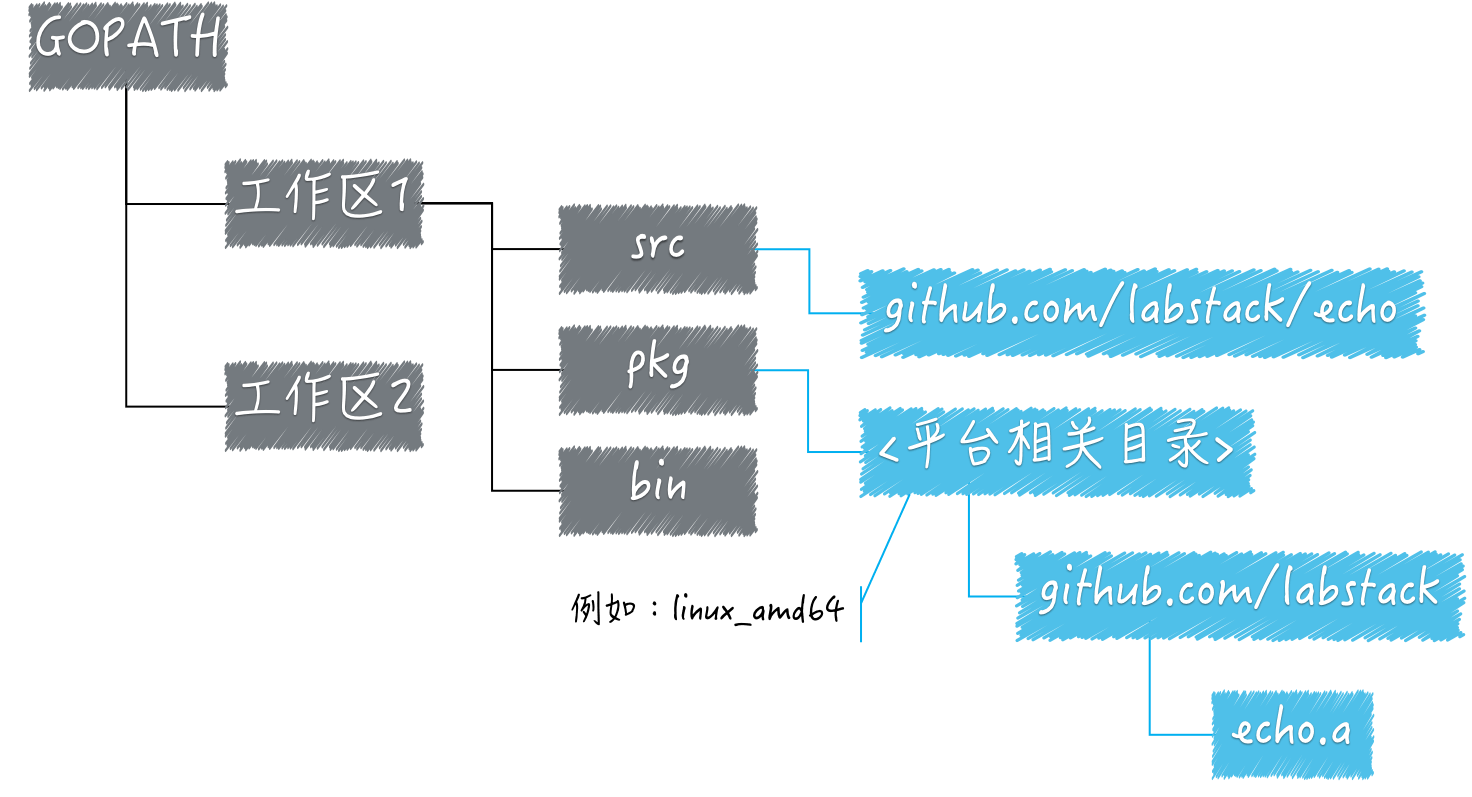由 CyanHall.com
创建于 2020-11-12,
上次更新:2021-04-30。
👉 如果有用请点赞。
如果有用请点赞。 
* 图片来自郝林《Go语言核心36讲》
👉

* 图片来自郝林《Go语言核心36讲》
1. env
go -h
go env
go version # go1.15.4 darwin/amd64
# GOROOT: Go 语言的安装路径
# GOPATH: 工作区目录的路径(第三方包保存的目录),bin, pkg(安装后的 *.a 文件, archive file), src
# GOBIN: Go 可执行文件的路径
go build # 构建
go install # 安装
go build -a # 不但目标代码包总是会被编译,它依赖的代码包也总会被编译,即使依赖的是标准库中的代码包也是如此。
go build -n # 只查看,不执行
go build -x # 查看执行详情
go build -v # 查看编译的代码包的名称
3. run
// run
go run hello.go
go build hello.go; ./hello
5. init
package main
import "fmt"
func init() {
fmt.Println("init 1")
}
func main() {
fmt.Println("main")
}
func init() {
fmt.Println("init 2")
}
// init 1
// init 2
// main
7. struct
type Book struct {
title, author string
pages int
}
book = Book{author: "Book author", pages: 256, title: "Book Name"}
// or
book = Book{}
fmt.Println(book.title)
20. 字典
m := map[string]int{"abc": 123, "xyz": 789}
n, is_exist := m["hello"] // 0 false
m = nil
fmt.Println(m["abc"]) // 0
m["dfg"] = 456
delete(m, "dfg")
11. make
m := make(map[string]int)) // map[]
s := make([]int, 3, 5)
fmt.Println(s, len(s), cap(s)) // [0 0 0] 3 5
13. clone
sClone := append(s[:0:0], s...) // s is a slice
// or
var sClone []T
if s != nil {
sClone = make([]T, len(s))
copy(sClone, s)
}
15. function parameters
func Sum(values ...int64) (sum int64) {
// values's type is []int64。
sum = 0
for _, v := range values {
sum += v
}
return sum
}
Sum(2, 3, 5)
17. 字符串
import (
"strings"
)
strings.Contains("something", "some") // true
19. 切片
var number_slice []int // []
// Recreate to append
number_slice = append(number_slice, 1) // [1]
// Create a new slice from an array
some_numbers := number_array[0:1] // [0]
21. 循环
names := []string{"a", "b", "c"} // [a b c]
for i, name := range names {
fmt.Printf("%d. %s
", i+1, name)
}
// 1. a
// 2. b
// 3. c
23. Channel
ch := make(chan int, 10) // create channel
close(ch) // close channel
ch <- v // send v to ch
v = <-ch // accept v from ch
v, sentBeforeClosed = <-ch
cap(ch) // capacity
len(ch) // length
go func(ch <-chan int) {
ch <- 123 // send 123 to ch
}
go func(ch chan<- int) {
n := <-ch // get value from ch
}
25. select-case
package main
import "fmt"
func main() {
c := make(chan string, 2)
trySend := func(v string) {
select {
case c <- v:
default: // 如果c的缓冲已满,则执行默认分支。
}
}
tryReceive := func() string {
select {
case v := <-c: return v
default: return "-" // 如果c的缓冲为空,则执行默认分支。
}
}
trySend("Hello!") // 发送成功
trySend("Hi!") // 发送成功
trySend("Bye!") // 发送失败,但不会阻塞。
// 下面这两行将接收成功。
fmt.Println(tryReceive()) // Hello!
fmt.Println(tryReceive()) // Hi!
// 下面这行将接收失败。
fmt.Println(tryReceive()) //
}
27. 接口
// res.Data is <interface {}>, res.Data > data is <[]interface {}>
items = res.Data.([]interface{})
for i, item := range response {
data := item.(map[string]interface{})
data["id"].(float64)
}
29. Debugger 内部
# Set breakpoint
break [path/filename].go:[line_num]
# Run and should pauses at the breakpoint
continue
# Print variable
print [variable_name]
# Move to next line in the source
next
2. Hello
// hello.go The program entry main function must be in a code package named main.
package main
import (
"fmt"
)
func main() {
str := "world"
text := fmt.Sprintf("hello %s! happy coding.", str)
fmt.Println(text)
}
4. Command Argv
package main
import (
"flag"
"fmt"
)
var name string
func init() {
flag.StringVar(&name, "name", "everyone", "The greeting object.")
}
func main() {
flag.Parse()
fmt.Printf("Hello, %s!
", name)
}
//
go run test.go -h
go run test.go -name=123 // Hello, 123!
6. import
import format "fmt" // format.Println()
import "fmt" // fmt.Println()
import . "fmt" // use Println directly, not recommended
import _ "net/http/pprof" // used to load pprof package, it's init function will be called.
8. Array, Slice, Map
[100]Book // Array, with element type Book
[]Book // Slide, with element type Book
map[string]Book // Map, with key value: string - Book
books := [...]Book {
{title: "title1"},
{title: "title2"},
{title: "title3"},
}
len(books) // 3
cap(books) // 3
19. 切片
s0 := []int{1, 2, 3}
s1 := append(s0, 4, 5)
fmt.Println(s0, cap(s0)) // [1, 2, 3] 3
fmt.Println(s1, cap(s1)) // [1, 2, 3, 4, 5] 6
// Note the cap is 6, not 5
s3 := append(s0, s0...) // [1, 2, 3, 1, 2, 3]
12. iterate
for key, element = range aContainer {
}
14. strings
import (
"strings"
)
len("hello")
strings.HasPrefix("helloWorld", "hello")
16. JSON
type Config struct {
Name bool `json:"name"` // OK
Name bool `json: "name"` // Error
Name bool `json:name` // Error
}
18. 数组
var number_array [3]int // [0, 0, 0]
append(number_array, 1) // Error
number_array[0] = 1 // [1, 0, 0]
20. 字典
your_map := make(map[string]int)
your_map["key"] = 1
fmt.Println(your_map["key"]) // 1
// Remove key
delete(elements, "key")
22. goroutine
go say("hello") // run say in goroutine
24. Loop Channel
for x, ok := <-c; ok; x, ok = <-c {
fmt.Println(x)
}
for v := range aChannel {
// do something
}
// equivalent
for {
v, ok = <-aChannel
if !ok {
break
}
// do something
}
26. methods
type Book struct {
pages int
}
func (b Book) Pages() int {
return b.pages
}
func (b *Book) SetPages(pages int) {
b.pages = pages
}
var book Book
book.SetPages(123) // = (*Book).SetPages(&book, 123)
book.Pages() // = Book.Pages(book)
28. 使用 Delve 调试
# https://github.com/go-delve/delve
dlv debug app.go
30. Gin
// Read Request Body in JSON
type GitHubInput struct {
Zen string `json:"zen"`
}
var input GitHubInput
if err := c.ShouldBindJSON(&input); err != nil {
c.JSON(http.StatusBadRequest, gin.H{"error": err.Error()})
return
}
input.Zen
// Read Header
c.Request.Header.Get("X-GitHub-Event")
// HTTP Response
c.JSON(http.StatusBadRequest, gin.H{"error": err.Error()})
c.String(200, input.Zen)
更多























